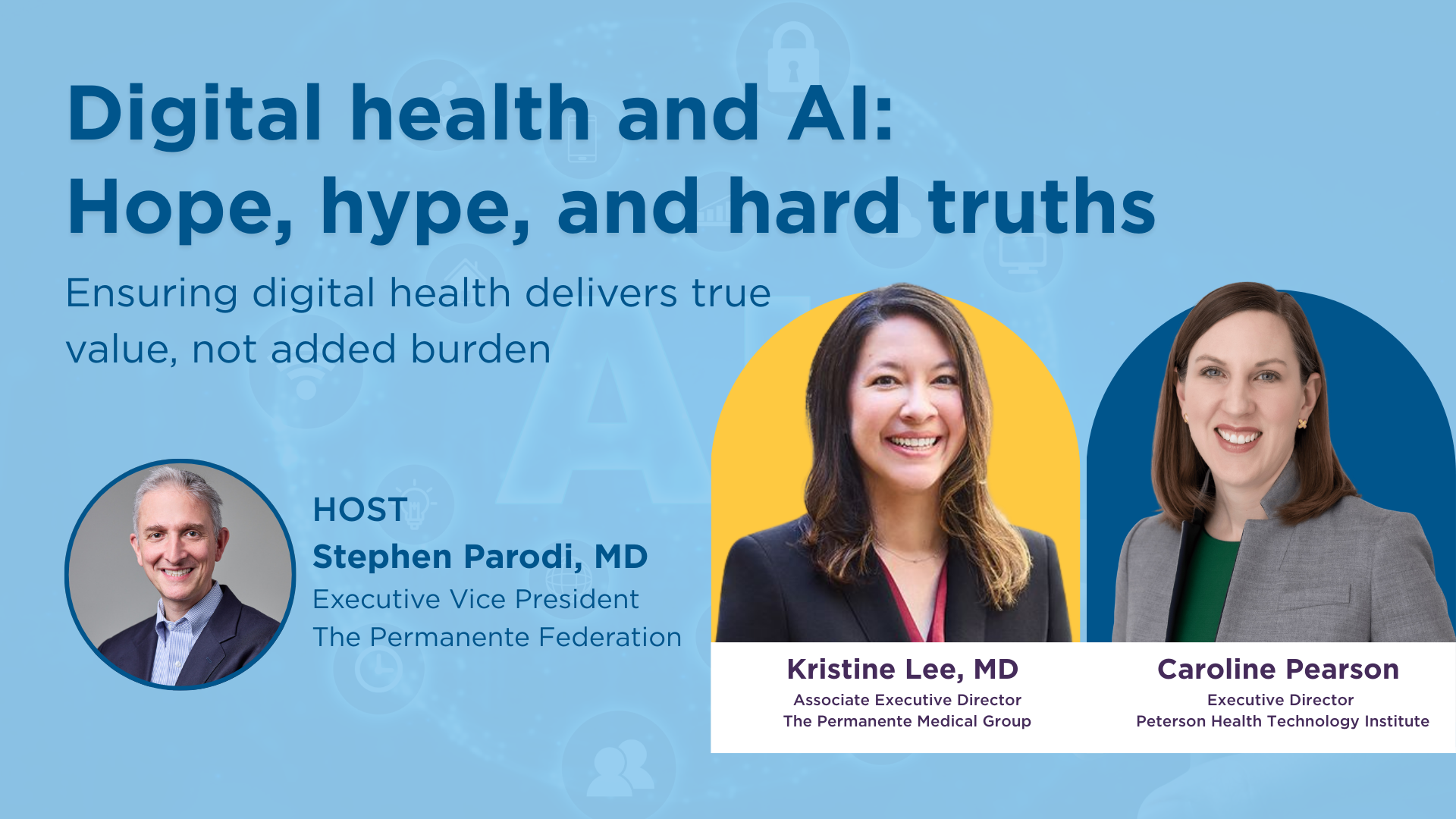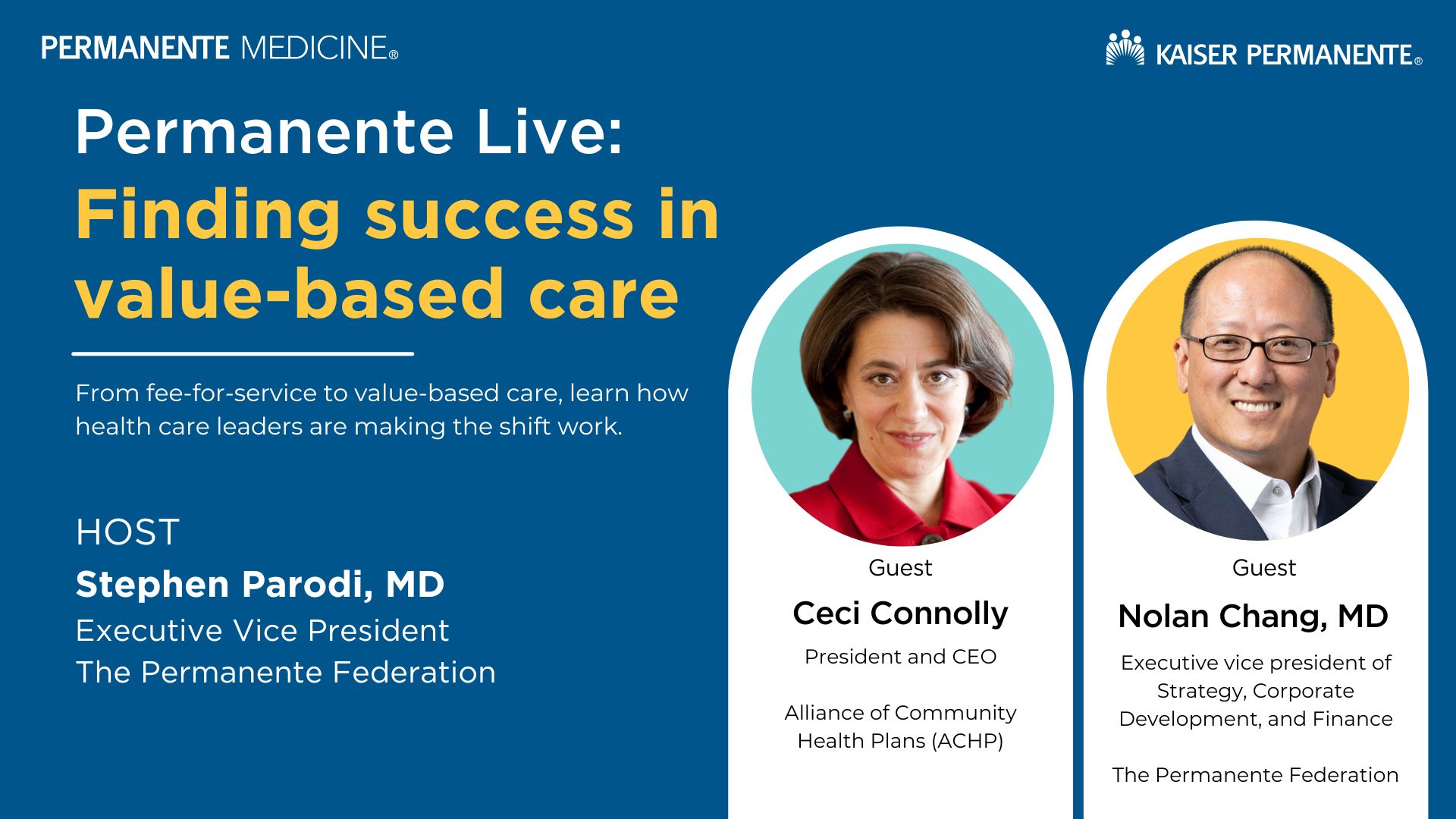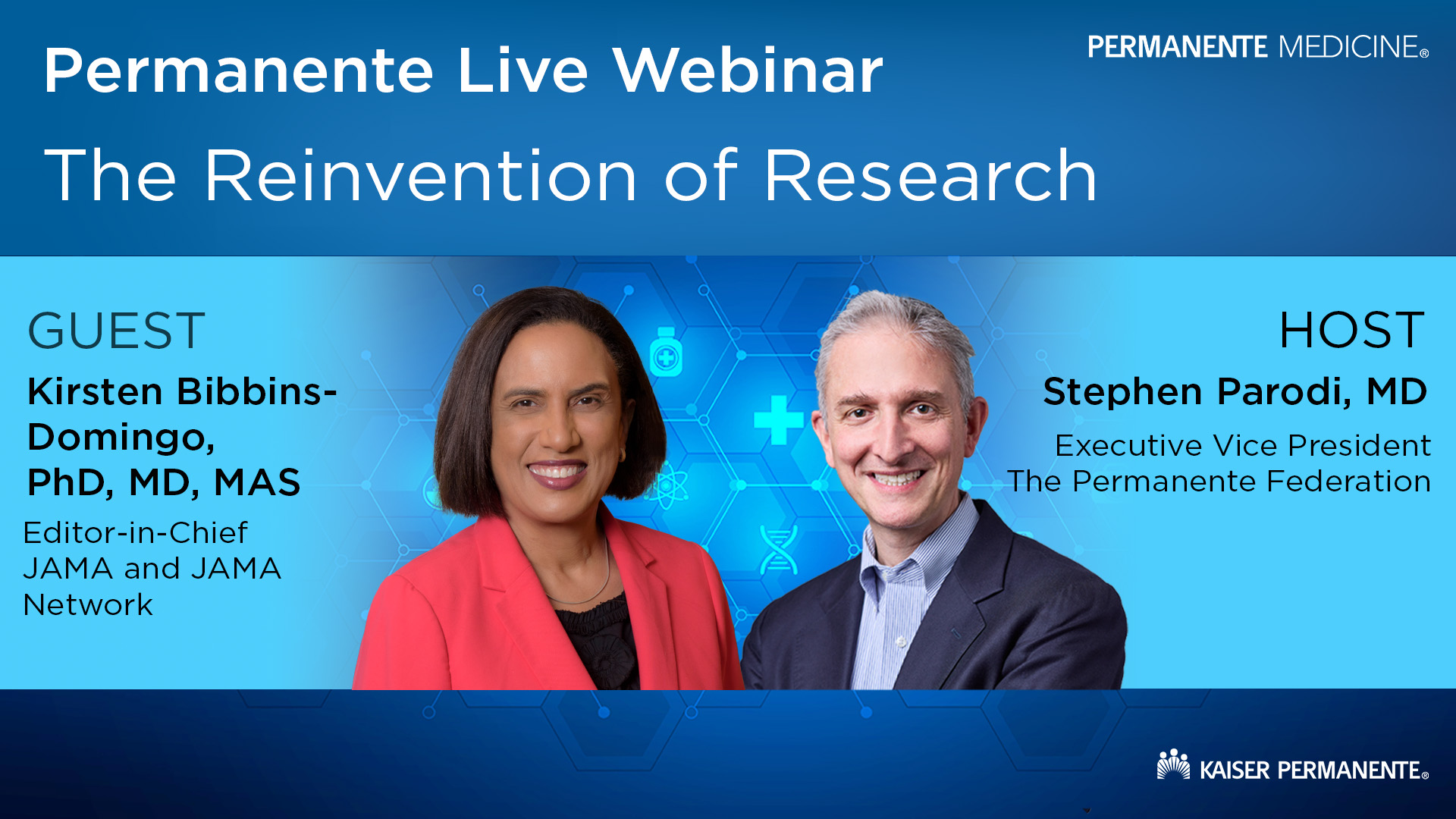Discover what truly adds value in digital health and AI. Experts discuss ambient AI, chronic disease tools, ROI, policy, and how leaders choose safe, effective innovations.
Supporting physician wellness through the COVID-19 pandemic
Permanente leaders share ways to address burnout, physician well-being
This year’s National Doctors’ Day observance had special meaning as it marked the one-year anniversary of the COVID 19 pandemic. To honor the heroic efforts of physicians and care teams, The Permanente Federation gathered key physician leaders on March 30, 2021, for a webinar to discuss the topic of physician well-being.
Titled “COVID-19 and physician wellness: the path forward,” panelists reflected on the importance of programs to help doctors stay healthy – physically and mentally – given the critical role they play in caring for patients during an unprecedented pandemic.
“There was an emotional toll” on physicians and health care workers, said Richard S. Isaacs, MD, FACS, the Federation’s co-CEO and one of the panel speakers. “Many had to serve as surrogate family members for patients because their loved ones could not be with them in the hospital during their time of greatest need. This has created a huge and lasting toll.”
Other speakers talked about the programs and resources provided by the Permanente Medical Groups to help support physicians in the past year. Dawn Clark, MD, chief wellness officer at Southern California Permanente Medical Group, talked about the group’s Psychological Support Teams that provided mental health resources and were proactively deployed to high-risk departments to support clinicians.
“It’s really heart-warming to listen to people really share their very moving stories,” Dr. Clark said about the support group’s interaction with physicians. “On all the debriefing interviews I’ve been on, not one person leaves. So while not everyone participates, everyone’s very engaged in listening.”
The panel was moderated by Stephen Parodi, MD, executive vice president of External Affairs, Communications and Brand at the Federation.
Panel speakers:
- Ramin Davidoff, MD, co-CEO, The Permanente Federation; executive medical director and chairman, Southern California Permanente Medical Group; chairman and CEO, The Southeast Permanente Medical Group; and chairman and CEO, Hawaii Permanente Medical Group.
- Richard S. Isaacs, MD, FACS, co-CEO, The Permanente Federation; CEO and executive director, The Permanente Medical Group; and president and CEO, Mid-Atlantic Permanente Medical Group.
- Dawn Clark, MD, chief wellness officer, Southern California Permanente Medical Group.
- Ellie Farahabadi, MD, associate executive director, The Permanente Medical Group.
You can view the full replay of the webinar above. The following are questions that came from attendees that the panel wasn’t able to address during the webinar.
Q: You spoke about the need to find new ways to invest in physician well-being. What solutions are you looking at and considering?
Some additional programs we plan to focus on include the following:
- De-stigmatizing the need for emotional support
- Increasing leadership rounding to address real-world problems facing our physicians to ensure they feel seen, valued, and heard
- More peer support
- Continuous improvement of back office support and flexing to adjust for virtual appointments giving doctors and patients a win-win
Q: Dr. Clark mentioned some adaptations health care teams made during COVID-19 that have improved workflows and physician wellness. What are some adjustments you’ve observed and would want to keep beyond the pandemic?
Many of our unit-based teams worked to address rapidly evolving quality issues that were brought about by a sudden shift toward virtual care. These are workflows that improved process during the pandemic and can continue into the future. Other examples include our COVID-19 dashboard, which allowed resources – including people – to be easily moved to areas that were hard hit. Also, because so many departments were making sudden workflow changes, the regions should promote “de-brief” town halls to learn the workflows that were successful and then focus on how to continue and spread these best practices.
Q: I am a retired Permanente physician. I have been doing volunteer work for the county in its COVID testing and now their vaccination program. I have heard that our colleagues in Kaiser Permanente are exhausted during this pandemic. Is there any role for us to help our colleagues if the need arises either within the pandemic or after the pandemic?
Monitoring the exhaustion of our physicians is a top priority. The various Permanente Medical Groups may have opportunities for retired PMG physicians, so you should check with the Human Resources Department of your area medical group for more details.
In some Permanente Medical Groups, there are physician assistance programs that allow our doctors to share their experience as a group. This type of support group allows our physicians to not feel alone. For some groups, retired physicians are allowed to join and can contribute to current physicians by sharing their experience on how they coped with unusual workload, such as that caused by the pandemic.
Also, as a trusted source for health information, one of the most important roles current and retired Permanente physicians can play to end the pandemic is by being an advocate of the vaccine to those within your network. Nearly 40% of Americans still say they’re not planning to get vaccinated even when it’s their turn (at least for now). You can refer to these tips to help build confidence in those who may be hesitant about getting vaccinated. Also, you can visit the volunteer services page on our website for available opportunities if you’re interested in contributing in other ways.
Q: It’s so nice to see leaders from different PMGs in this event! Thank you all! Moving forward, any plan to further expand the physician collaboration from both regions?
We will be hosting new webinars that focus on top-of-mind subjects in medicine and health care each quarter. These virtual events will include Permanente physician speakers from across all our areas of service coming together and sharing their perspectives.
Q: Since many of us got the vaccine very early, should we look into booster shots for physicians? Or are we thinking that we may only need this if the vaccine starts to look like it will not provide coverage for mutations?
While it is possible that booster shots will be needed seasonally or annually to ensure protection, the need for – and timing of – booster doses for COVID-19 vaccines has not been established by public health experts. More data is currently being collected on the longevity of the vaccine. We will continue to follow guidance from the CDC in administering booster shots as it becomes available.
Q: Have you discovered generation-based differences that address how wellness should be approached. If so, what implications does it have for emotional health as we learn to recognize and enhance our wellness collectively across generational gaps?
Addressing workplace wellness for all generations means focusing on elements like psychological safety, professional development, professional purpose, and building workplace friendships. However, each group may prioritize these drivers differently. We are actively researching strategies for approaching wellness, and a variety of other workplace factors, that may differ between generations. Employee resource groups like genKP bring together employees of different generational backgrounds to help shape the future workplace.
Q: With the necessary and sudden shift to virtual appointments during the pandemic, we realized that not all patients need to be seen in person. How can we ensure that we will have the flexibility to continue virtual appointments after the pandemic ends?
Patients have responded positively to virtual care during the pandemic, so this will continue to be an option for those who choose it. Ensuring that the technology we use for telemedicine is simple and efficient will be key to supporting efficient workflow for clinicians. Additionally, it’s important to ensure tools are simple and intuitive for patients across demographics.


